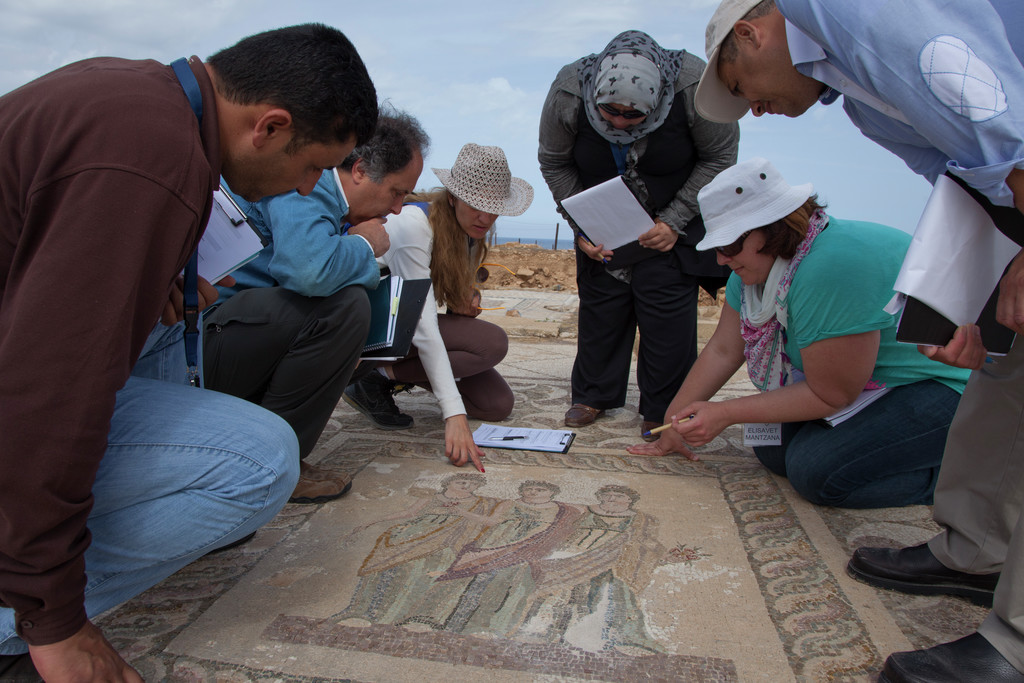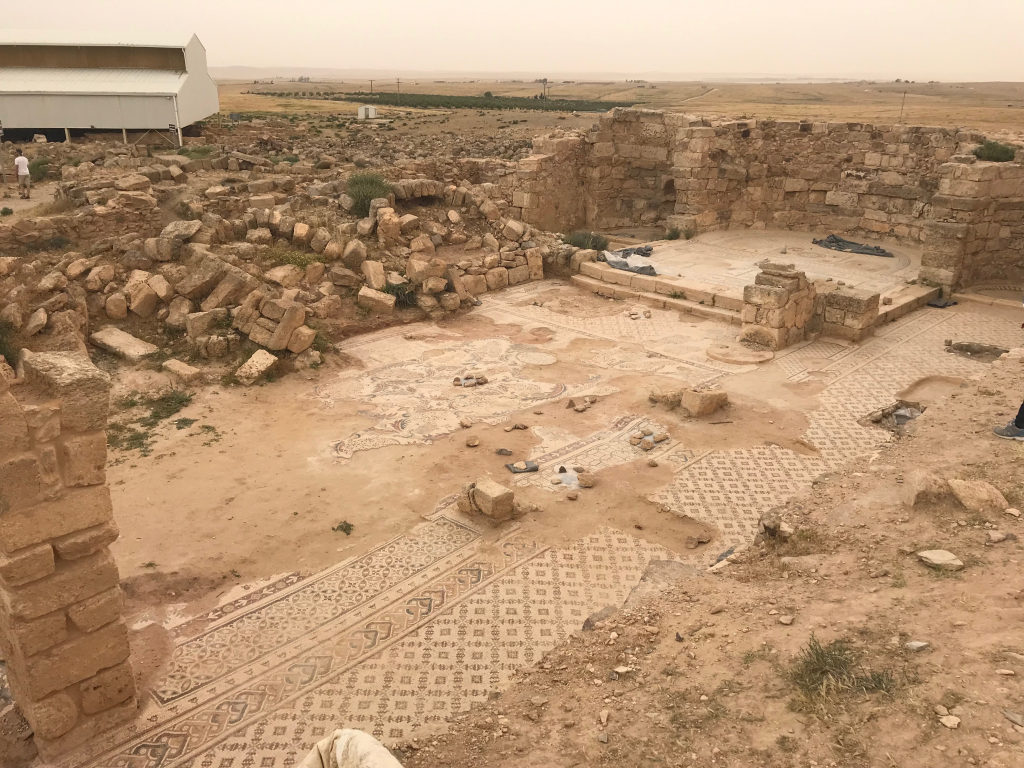I corsi avanzati di MOSAIKON formeranno professionisti per la conservazione a lungo termine dei mosaici
 Tom Roby advises participants in a MOSAIKON course conducting a condition survey exercise of the Three Oras Mosaic at the Paphos Archeological Park, Paphos, Cyprus, photograph by Scott S. Warren
Tom Roby advises participants in a MOSAIKON course conducting a condition survey exercise of the Three Oras Mosaic at the Paphos Archeological Park, Paphos, Cyprus, photograph by Scott S. Warren
Il Getty Conservation Institute (GCI) e il Centro Internazionale per lo Studio della Conservazione e del Restauro dei Beni Culturali (ICCROM) hanno annunciato che terranno due corsi di formazione avanzata in Giordania e Libano incentrati sulla conservazione dei mosaici nella regione.
Questi corsi intensivi fanno parte dei corsi conclusivi dell'iniziativa MOSAIKON, una collaborazione tra il GCI, la Getty Foundation, l'ICCROM e il Comitato Internazionale per la Conservazione dei Mosaici (ICCM). Dal 2008, MOSAIKON ha formato oltre 200 professionisti della conservazione provenienti dai Paesi della regione del Mediterraneo meridionale e orientale, che hanno tutti condotto ricerche e progetti pilota sul campo come parte della loro formazione.
"MOSAIKON è stato creato con l'obiettivo principale di promuovere le migliori pratiche per la conservazione dei mosaici nei siti archeologici, nei musei e nei depositi in tutta la regione mediterranea", ha dichiarato Jeanne Marie Teutonico, Direttore Associato del GCI. "Dopo oltre un decennio di corsi e di lavoro sul campo, l'iniziativa ha creato una vasta rete di professionisti della conservazione dei mosaici, che ci auguriamo condividano le conoscenze e le competenze acquisite durante la formazione per guidare le generazioni future".
Ogni corso è tenuto da esperti del settore per garantire la massima qualità della formazione teorica e pratica.
"L'ICCROM è onorata di aver assistito i professionisti regionali nella conservazione e gestione i siti archeologici con mosaici grazie ai 14 anni di esperienza di MOSAIKON e alla partnership dell'ICCROM attraverso il programma ATHAR", ha dichiarato Zaki Aslan, Direttore del Centro regionale per la conservazione del patrimonio culturale nel mondo arabo (ICCROM - Sharjah). "Nonostante la conclusione di questa iniziativa, continueremo a dedicarci alla sua missione e ai suoi obiettivi, e a sostenere la collaborazione regionale con gli Stati membri nel Mediterraneo".
MOSAIKON Cantiere di formazione per la conservazione dei mosaici in deposito
Dal 10 ottobre al 4 novembre 2022
In collaborazione con GCI e ICCROM, la Direzione Generale delle Antichità del Libano (DGA) terrà un corso di quattro settimane a Sidone, in Libano, incentrato sulla conservazione dei mosaici in deposito. Il corso coinvolgerà sei dipendenti della DGA e cinque dipendenti governativi provenienti dalla Libia e dalla Giordania per migliorare la capacità delle autorità del Medio Oriente e del Nord Africa di conservare l'importante patrimonio musivo. Le lezioni e le esercitazioni pratiche saranno condotte utilizzando esempi di un'ampia collezione di mosaici staccati provenienti dal centro di Beirut e conservati a Sidone dal 1998.
"I mosaici sono sempre più minacciati dall'edilizia moderna, dai saccheggi e dalla mancanza di professionisti qualificati per supportare il necessario lavoro di conservazione e manutenzione sia in loco che nei depositi", ha dichiarato Sarkis Al KhourI, Direttore Generale della Direzione Generale delle Antichità del Libano. "Il Libano è stata una delle prime destinazioni dei corsi MOSAIKON e questi corsi hanno ampliato notevolmente le nostre competenze locali necessarie per gestire i problemi in corso".
I partecipanti al corso per tecnici della conservazione studieranno la metodologia per documentare e conservare i mosaici staccati, utilizzando malte di calce per stabilizzarli e reintegrarli, insieme a misure preventive per conservarli a lungo termine. Il cantiere di formazione integra un precedente corso MOSAIKON tenutosi nel 2018 presso il sito di Volubilis, in Marocco, in cui i tecnici formati hanno appreso tecniche simili per documentare e conservare i mosaici staccati lasciati in deposito per decenni senza adeguati trattamenti di stabilizzazione.
Rome, September 19, 2022 – The Getty Conservation Institute (GCI) and International Centre for the Study of the Preservation and Restoration of Cultural Property (ICCROM) have announced they will hold two advanced training courses in Jordan and Lebanon focused on the conservation of mosaics in the region.
These intensive trainings are among the final courses of the MOSAIKON initiative, a collaboration of the GCI, the Getty Foundation, ICCROM, and the International Committee for the Conservation of Mosaics (ICCM). Since 2008, MOSAIKON has trained over 200 conservation professionals from countries of the southern and eastern Mediterranean region, all of whom conducted research and model field projects as part of their training.
“MOSAIKON was created with the principal goal of promoting best practices for mosaic conservation at archaeological sites, museums, and storage facilities throughout the Mediterranean region,” said Jeanne Marie Teutonico, associate director at the GCI. “After over a decade of courses and field work, the initiative has established an extensive network of dedicated mosaic conservation professionals, all of whom we hope will share the knowledge and skill attained in their trainings to mentor future generations.”
Each course is taught by experts in the field to ensure the highest quality in theoretical and practical training.
“ICCROM is honoured to have helped regional professionals conserve and manage archaeological sites with mosaics through 14 years of MOSAIKON experience and ICCROM’s partnership through its ATHAR Programme,” said Zaki Aslan, Director of the Regional Centre for the Conservation of Cultural Heritage in the Arab World (ICCROM - Sharjah). “Despite this initiative coming to a close, our dedication to its mission and objectives, and supporting regional collaboration with Member States in the Mediterranean, will continue.”
 The site of Um-al-Rasas in Jordan, one of the open-air classrooms the course will be using to discuss shelters and reburial, photograph by Leslie Friedman
The site of Um-al-Rasas in Jordan, one of the open-air classrooms the course will be using to discuss shelters and reburial, photograph by Leslie Friedman
MOSAIKON Advanced Training on Preventive Conservation Measures for Archaeological Sites with Mosaics: Shelters & Reburial
September 18 to September 30, 2022
In partnership with GCI and ICCROM, the Department of Antiquities of Jordan will hold a two-week course based in Amman, Jordan that will focus on two strategic and sustainable approaches to conserving archaeological sites: the use of protective shelters and reburial. Using the archaeological sites of Jerash, Um al Rasas, and Madaba as outdoor classrooms, and taking advantage of the wealth of mosaic heritage in Jordan, course participants will learn these complex techniques that can help achieve more stable environments for fragile historic remains, such as mosaics.
“Increasing the local expertise of professionals capable of managing and conserving cultural heritage, particularly archaeological sites, is of the utmost importance as we face a multitude of challenges in the field such as rapid urban development, threats from climate change, and simply not enough resources,” said Professor Fadi Bala’wi, the Director General at Department of Antiquities of Jordan. “This course will help Jordanians and other heritage professionals from the region gain a better understanding of the complexities and opportunities of preventive practices such as sheltering and reburial, which are key to the preservation of our heritage.”
While previous MOSAIKON courses on archaeological site conservation covered a suite of topics, from documentation to site presentation, this course will provide more in-depth information on shelters and reburial as sustainable and preventive conservation practices. The two-week course will cover the decision-making process of these practices from feasibility to implementation, all within the context of a conservation management framework.
Eighteen participants from 10 countries—Albania, Algeria, Egypt, Greece, Jordan, Lebanon, Morocco, Palestine, Serbia, and Tunisia—were chosen to participate in the course. Most of the participants completed one of the three previous MOSAIKON courses held in Tyre, Lebanon in 2010, Paphos, Cyprus in 2014, and Volubilis, Morocco in 2017, or possessed similar training. Participants were chosen based on their performance in previous courses and their ability to apply and disseminate the approaches taught.
MOSAIKON Training Worksite for the Conservation of Mosaics in Storage
October 10 to November 4, 2022
In partnership with GCI and ICCROM, the Directorate General of Antiquities of Lebanon (DGA) will hold a four-week course based in Sidon, Lebanon that will focus on the conservation of mosaics in storage. This course will convene six DGA employees and five government employees from Libya and Jordan to enhance the capacity of authorities in the Middle East and North Africa to conserve important mosaic heritage. Lessons and practical exercises will be conducted using examples from a large collection of lifted mosaics from downtown Beirut that have been stored in Sidon since 1998.
“Mosaics are increasingly threatened by modern construction, looting, and a lack of trained professionals to support much needed conservation and maintenance work both onsite and in storage facilities,” said Sarkis El Khoury, the Director General at Directorate General of Antiquities of Lebanon. “Lebanon was one of the first destinations for MOSAIKON courses and these trainings have greatly expanded our local expertise needed to manage ongoing issues.”
Participating conservation technician trainees will study methodology for documenting and conserving lifted mosaics using lime mortars to stabilize and re-back them, along with preventive measures to store them long-term. The training worksite complements an earlier MOSAIKON course held at the site of Volubilis, Morocco in 2018, in which trained technician-level practitioners learned similar techniques to document and conserve lifted mosaics left in storage for decades without adequate stabilization treatments.
.jpg) Group photo of participants and staff of a MOSAIKON course at the Paphos Archeological Park, Paphos, Cyprus, photograph by Scott S. Warren
Group photo of participants and staff of a MOSAIKON course at the Paphos Archeological Park, Paphos, Cyprus, photograph by Scott S. Warren
